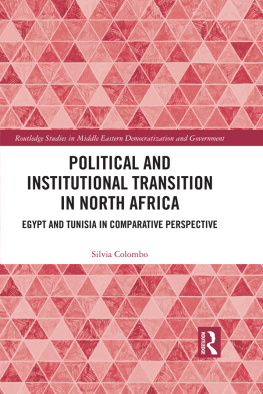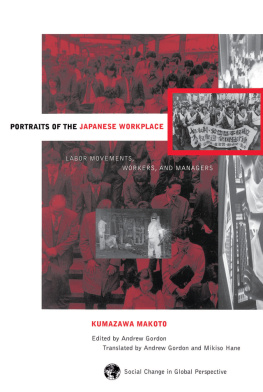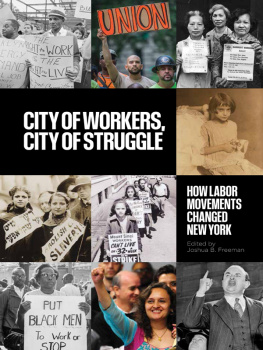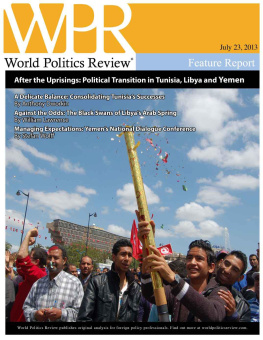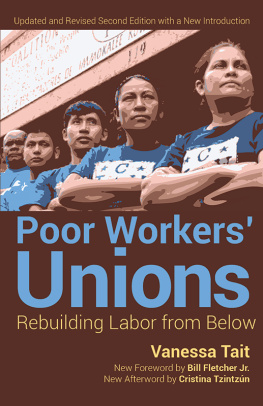Beinin - Workers and Thieves: Labor Movements and Popular Uprisings in Tunisia and Egypt
Here you can read online Beinin - Workers and Thieves: Labor Movements and Popular Uprisings in Tunisia and Egypt full text of the book (entire story) in english for free. Download pdf and epub, get meaning, cover and reviews about this ebook. City: Stanford, year: 2015, publisher: Stanford Briefs, genre: Politics. Description of the work, (preface) as well as reviews are available. Best literature library LitArk.com created for fans of good reading and offers a wide selection of genres:
Romance novel
Science fiction
Adventure
Detective
Science
History
Home and family
Prose
Art
Politics
Computer
Non-fiction
Religion
Business
Children
Humor
Choose a favorite category and find really read worthwhile books. Enjoy immersion in the world of imagination, feel the emotions of the characters or learn something new for yourself, make an fascinating discovery.

Workers and Thieves: Labor Movements and Popular Uprisings in Tunisia and Egypt: summary, description and annotation
We offer to read an annotation, description, summary or preface (depends on what the author of the book "Workers and Thieves: Labor Movements and Popular Uprisings in Tunisia and Egypt" wrote himself). If you haven't found the necessary information about the book — write in the comments, we will try to find it.
Beinin: author's other books
Who wrote Workers and Thieves: Labor Movements and Popular Uprisings in Tunisia and Egypt? Find out the surname, the name of the author of the book and a list of all author's works by series.
Workers and Thieves: Labor Movements and Popular Uprisings in Tunisia and Egypt — read online for free the complete book (whole text) full work
Below is the text of the book, divided by pages. System saving the place of the last page read, allows you to conveniently read the book "Workers and Thieves: Labor Movements and Popular Uprisings in Tunisia and Egypt" online for free, without having to search again every time where you left off. Put a bookmark, and you can go to the page where you finished reading at any time.
Font size:
Interval:
Bookmark:
WORKERS AND THIEVES
Labor Movements and Popular Uprisings in Tunisia and Egypt
JOEL BEININ
stanford briefs
An Imprint of Stanford University Press
Stanford, California
Stanford University Press
Stanford, California
2016 by the Board of Trustees of the Leland Stanford Junior
University. All rights reserved.
No part of this book may be reproduced or transmitted in any form or by any means, electronic or mechanical, including photocopying and recording, or in any information storage or retrieval system without the prior written permission of Stanford University Press.
Printed in the United States of America on acid-free, archival-quality paper
Library of Congress Cataloging-in-Publication Data
Beinin, Joel, 1948 author.
Workers and thieves : labor movements and popular uprisings in Tunisia and Egypt / Joel Beinin.
pages cm
Includes bibliographical references and index.
ISBN 978-0-8047-9804-4 (pbk. : alk. paper) ISBN 978-0-8047-9864-8 (electronic)
1. Labor movementTunisiaHistory. 2. Labor movementEgyptHistory. 3. Working classPolitical activityTunisiaHistory. 4. Working classPolitical activityEgyptHistory. 5. TunisiaHistoryDemonstrations, 2010 6. EgyptHistoryProtests, 2011 I. Title.
HD8784.B45 2015
961.105'2dc23
Typeset by Bruce Lundquist in 10/13 Adobe Garamond
FOR IZZIE

A JOB IS A RIGHT, YOU PACK OF THIEVES!
TUNISIA, GAFSA, 2008; SIDI BOUZID, 2010

BREAD, FREEDOM, SOCIAL JUSTICE
EGYPT, 2011 PROTESTS
CONTENTS
INTRODUCTION
WORKERS, COLLECTIVE ACTION, AND POLITICS
In 2004 Kamal Abbas, the general coordinator of Egypts Center for Trade Union and Workers Services, told me, The best thing that can be done for democracy in this country is to promote the rights of workers. An upsurge of wildcat strikes, sit-ins, demonstrations, and other workers collective actions that began in the late 1990s was escalating as we spoke. But neither of us understood its full significance at that time. During the 2000s only a handful of Western journalists occasionally reported on these contestations. Inside the Beltway think-tankers almost completely disregarded them. No journalists or foreign policy experts considered these collective actions in the context of the accelerating privatization of Egypts public resources and the attendant loss of job security, social services, and workers status as productive contributors to the national economythe most common contentious issues.
Until the January 25, 2011 popular uprising that ousted President Hosni Mubarak, most observers of contemporary Egypt focused on its putative economic and political liberalization and its role in the nonexistent Palestinian-Israeli peace process. Euro-American scholars and foundations engaged in democracy promotion and their Egyptian counterparts enthused about the
The regime of Tunisias President Zine El-Abidine Ben Ali, despite promises of political liberalization after he seized power on November 7, 1987, was even more repressive than Mubaraks in the 2000s. International advocacy NGOs duly documented Tunisias egregious human rights violations. But most Western Tunisia experts and political leaders expressed only pro forma concerns about them. Instead they focused on what French presidents Jacques Chirac and Nicholas Sarkozy and many others acclaimed as Tunisias economic miracle.
Tunisian workers engaged in an even larger number of strikes and collective actions than their Egyptian counterparts in the 2000s, although they are less well documented due to more severe media censorship. A six-month-long rebellion in the Gafsa phosphate-mining basin in 2008 prompted by a demand for jobs targeted both the phosphate mining company and nepotistic local officials of the national trade union federation (LUnion gnrale tunisienne du travail, UGTT), while the leadership of the phosphate miners union stood with the regime. The slogan raised in GafsaA job is a right, you pack of thieves!reappeared three years later in Sidi Bouzid and the center-west regions where the uprising that ousted Ben Ali on January 14, 2011 began.
Young cultural revolutionaries like Egypts Ramy Essam and Tunisias El General, youth groups like Egypts April 6 Youth Movement, Facebook pages like We are all Khaled Said, bloggers like Tunisias Lina Ben Mhenni and Slim Amamou and Egypts Zeinobia, and digital media like Nawaat.org were certainly factors in mobilizing the 2011 popular uprisings. However, the satellite TV channel Al Jazeera had a far larger audience and a broader impact than any digital media or radical cultural expressions. Moreover, digital media and radical cultural expressions were not the principal factors in the most intense contestations that unfolded in the decade before those uprisings.
Using the examples of Egypt and Tunisia, this book seeks to explain why the experts were wrong and Kamal Abbas was right. Workers participation in the social ferment preceding the ouster of the autocrats and in the political realignments after their demise was far more important than most observers have acknowledged. However, the role of workers cannot fully be explained by their economic grievances.
Who are the workers Kamal Abbas was referring to? Throughout much of the Middle East and North Africa (MENA), the terms workers (al-ummal) and working class (al-tabaqa al-amila) are commonly used and understood, although popular definitions are imprecise. Who is included in the working class, and why this is a commonly used term, depends on a complex matrix of historically forged local and national economic, political, social, and cultural relationships. Workers do not have fixed, immutable identities, universal forms of consciousness, and certainly not a predetermined historical trajectory.
Workers are free wage laborers in two respects: they are free to seek employment in the market and to accept it on the best terms available, and free of independent access to the means of production. In the MENA region wage labor is often seasonal. Some industrial and agricultural workers or their families also own or rent small plots of agricultural land. Since the early twentieth century, an important part of the North African (Maghrebi) working class has migrated to France in search of jobs that did not exist at home. Labor migration in the MENA region became widespread with the oil boom of the 1970s. Egypt has been, since then, the leading Arab labor exporter, with important consequences for the experiences and consciousness of its workers. Those employed in mechanized transport and industrial enterprises, as well as handicraft artisans and the self-employed who possess little capital other than their hand tools, have been members of trade unions and are popularly considered part of the working class.
White-collar workers are powerful actors in the Tunisian labor movement. Schoolteachers and healthcare, postal, and telecommunications workers have long been the most militant members of the UGTT. Many were radicalized during their university studies and brought their political commitments into their unions, where they often served as the organic intellectuals of insurgent forces in the middle and lower levels of the UGTT. As they aged, some became bureaucrats, pragmatists, apologists for autocracy, and opportunists. Others persisted in maintaining a variety of left political views.
In Egypt, the enormous contingent of civil servants and lower-level white-collar public employees (
Next pageFont size:
Interval:
Bookmark:
Similar books «Workers and Thieves: Labor Movements and Popular Uprisings in Tunisia and Egypt»
Look at similar books to Workers and Thieves: Labor Movements and Popular Uprisings in Tunisia and Egypt. We have selected literature similar in name and meaning in the hope of providing readers with more options to find new, interesting, not yet read works.
Discussion, reviews of the book Workers and Thieves: Labor Movements and Popular Uprisings in Tunisia and Egypt and just readers' own opinions. Leave your comments, write what you think about the work, its meaning or the main characters. Specify what exactly you liked and what you didn't like, and why you think so.

